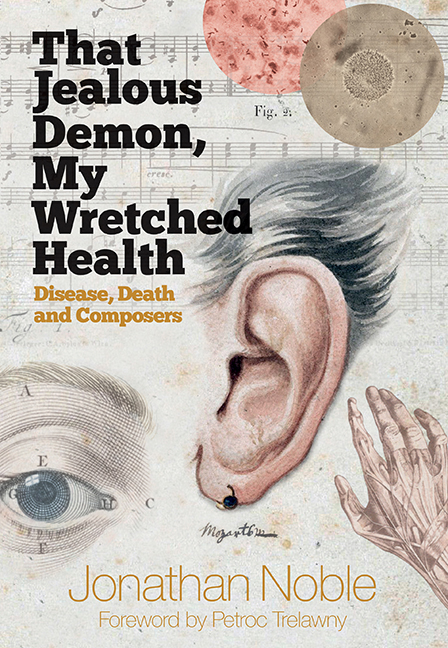Book contents
- Frontmatter
- Dedication
- Contents
- List of Illustrations
- Foreword
- Acknowledgements
- Medical Glossary
- Introduction
- 1 The Frailty of Youth
- 2 A Triumphant Old Age
- 3 Iatrogenic Afflictions
- 4 Syphilis
- 5 Alcoholism
- 6 Troubled Minds: Mental Illness and Suicide
- 7 Nerves Beyond the Edge: Other Afflictions of the Nervous System
- 8 Broken Hearts
- 9 Breathless: Respiratory Diseases
- 10 Cancer
- 11 The Ultimate Blow: Deafness
- Epilogue and Coda
- Appendix: Accidental and/or Violent Deaths
- References
- Bibliography
- Index
6 - Troubled Minds: Mental Illness and Suicide
Published online by Cambridge University Press: 05 September 2018
- Frontmatter
- Dedication
- Contents
- List of Illustrations
- Foreword
- Acknowledgements
- Medical Glossary
- Introduction
- 1 The Frailty of Youth
- 2 A Triumphant Old Age
- 3 Iatrogenic Afflictions
- 4 Syphilis
- 5 Alcoholism
- 6 Troubled Minds: Mental Illness and Suicide
- 7 Nerves Beyond the Edge: Other Afflictions of the Nervous System
- 8 Broken Hearts
- 9 Breathless: Respiratory Diseases
- 10 Cancer
- 11 The Ultimate Blow: Deafness
- Epilogue and Coda
- Appendix: Accidental and/or Violent Deaths
- References
- Bibliography
- Index
Summary
We poets in our youth begin in gladness:
But thereof come in the end despondency and madness
William Wordsworth, ‘Resolution and Independence’, 1807Some Psychiatric Disorders
A. Non-organic disease
Neuroses
• Anxiety
• Depression
• Obsessive-compulsive disorder
• Paranoia
Psychosis
• Schizophrenia
• Bipolar affective disorder (previously known as manic-depressive psychosis)
Personality disorder
• Alcoholism
• Other addictions
• Psychopathy
B. Organic brain disease
• Dementias
- Alzheimer's disease
- Niemann Pick disease (aka Pick's)
- Senile dementia (arterio-sclerotic)
• Wernicke's encephalopathy (alcoholism)
• General paralysis of the insane, or GPI (third-stage syphilis)
Diseases in group B, unlike those in A, are diseases whose consequences would be identifiable at an autopsy.
Introduction: Mental Illness Having already regarded alcoholism as a mental disturbance, we now consider other psychiatric disorders. It is a complicated group of disorders and more difficult to categorise than physical diseases, but the list above attempts a simple, if somewhat dated, classification. At some stage in their lives at least 25% of the Western population will report psychological illness. The question is where variations within a socially accepted range of normality merge into an illness. There have been repeated attempts to assess the role of madness in creativity. Is mental illness a positive driving force or an inhibition when considering the end product, be that a painting, novel or symphony? In a review of mental illness the names of great composers featured less than those of painters, poets or writers.
If we consider composers discussed in other chapters, it is clear that many fit into the list. Ravel (Chapter 3) had pre-senile dementia, and Rachmaninov (Chapter 10) and Elgar (Chapter 2) were melancholic, if not frankly depressive. Sibelius (Chapter 2) sometimes drank too much. Musorgsky (Chapter 5) did suffer from alcoholic dementia. Donizetti, Smetana and Wolf (Chapter 4) developed general paralysis of the insane (GPI). This chapter is confined to composers with major non-organic psychiatric problems (group A) which were sufficient to affect their compositional abilities or become life-threatening and/or to require periods of institutional care.
It is interesting to reflect on past psychiatric care. Straitjackets and padded cells are all but gone, and with them immersion in hot and cold baths.
- Type
- Chapter
- Information
- That Jealous Demon, My Wretched HealthDisease, Death and Composers, pp. 143 - 186Publisher: Boydell & BrewerPrint publication year: 2018



